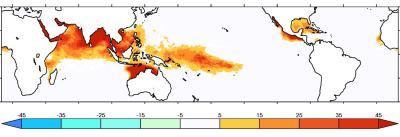The Growing Inadequacy of an Open-Ended Saffir-Simpson Hurricane-Wind Scale in a Warming World
Global warming increases available sensible and latent heat energy, increasing the thermodynamic potential wind intensity of tropical cyclones (TCs). Supported by theory, observations, and modeling, this causes a shift in mean TC intensity, which tends to manifest most clearly at the greatest intensities. A simple extrapolation of the Saffir-Simpson scale is used to define a hypothetical category 6, and we describe the frequency of TCs, both past and projected under global warming, that would fall under this category.
The sociological aspects of the messaging embodied in public TC warning are complicated, and despite its deficiencies in communicating the full range of tropical cyclone risks, it seems unlikely that usage of the Saffir-Simpson scale will end anytime soon Our results are not meant to propose changes to this scale, but rather to raise awareness that the wind-hazard risk from storms presently designated as category 5 has increased and will continue to increase under climate change.
Global warming leads to more intense tropical cyclones. Three separate lines of evidence from both observations and models suggest that the open-endedness of the 5th category of the Saffir-Simpson hurricane wind scale becomes increasingly problematic for conveying wind risk in a warming world. We investigate considering the extension to a 6th category of the Saffir-Simpson hurricane wind scale to communicate that climate change has caused the winds of the most intense tropical cyclones to become significantly higher.

